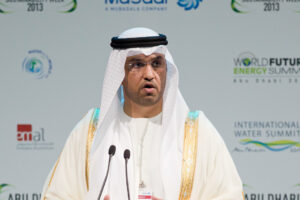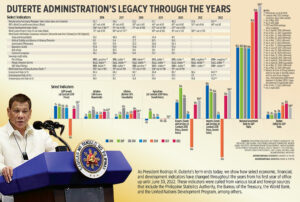Climate needs an ally like Sultan Al Jaber

SULTAN AHMED AL JABER CEO of Masdar and chairman of the Abu Dhabi Ports Co. (ADPC), gives a welcoming speech at the Opening Ceremony of World Future Energy Summit, part of Abu Dhabi Sustainability Week 2013, at the Abu Dhabi National Exhibition Centre. — FLICKR.COM/MASDAR CORPORATE
WHEN the United Nations announced that the United Arab Emirates (UAE) would host its 2023 climate summit, known as COP, many environmentalists scoffed. A climate conference in an oil state? When the UAE announced that the president would be the head of its national oil company, Sultan Al Jaber, the scoffing only grew louder. The activists should stop griping: Al Jaber is precisely the kind of ally the climate movement needs.
During a recent visit to India, Al Jaber outlined the gravity of the challenge ahead. He conveyed the UAE’s desire to help India meet its ambitious clean energy goals. He called for more investment in decarbonization technology, including nuclear and hydrogen power. And he endorsed an all-of-society approach that mobilizes every sector and asks more of development banks and financial institutions.
He also addressed the elephant in the room: the need to mitigate the climate impact of fossil fuels during the global transition to clean energy. “It is not a conflict of interest,” he said, alluding to his critics; “it is our common interest to have the energy industry working alongside everyone.”
There’s no escaping the fact that the world still needs oil and gas and will for some time, a reality that Al Jaber’s critics tend to ignore. Fighting climate change is not a question of ending all oil and gas production immediately, but of developing sufficient clean power to phase it out as quickly as possible — and doing so in a way that strengthens economies and lifts living standards, through policies that are “pro-growth and pro-climate at the same time,” as Al Jaber put it.
To be sure, Al Jaber has a financial interest in oil production, but he has a stake in the clean-energy industry, too. He’s the founding CEO and current chair of Masdar, which aims to generate 100 gigawatts of renewable power by the end of the decade, a goal that exceeds those set by some larger European nations. If every nation aimed to produce as much per-capita renewable power over the next seven years as the UAE, the fight against climate change could be transformed.
To their credit, most global leaders have supported Al Jaber’s appointment and the UN’s decision to host this year’s COP in the UAE, including President Joe Biden’s special climate envoy, John Kerry. But skepticism is inevitable, which puts an extra burden on Al Jaber to deliver.
As he prepares for November’s summit, it’s critical that Al Jaber ramp up pressure on rich countries to honor their financial commitments to the developing world; push development banks and sovereign-wealth funds to expand their ambitions; and help overcome barriers to greater private-sector investment in clean-energy projects, especially in the developed world.
He can also dispel some of the public skepticism about his appointment by taking aim at the biggest obstacle standing in the way of major climate progress: coal-fired power plants. Clean energy is now cheaper than coal power in much of the world, and where coal still has a price advantage (often because of subsidies), new public-private partnerships — like the one the G-20 forged with Indonesia last year — can help nations speed the transition.
There is a difference, of course, between giving a good speech and rallying the world to act. And so it was encouraging to hear Al Jaber stress in his speech that this year’s summit must be “a COP of action,” one that moves the world “from talking about goals to getting the job done.”
Environmental activists will rightly hold Al Jaber accountable for translating words into actions, but they should also recognize that far more can be accomplished by accepting him as an ally than dismissing him as a foe.
BLOOMBERG OPINION




